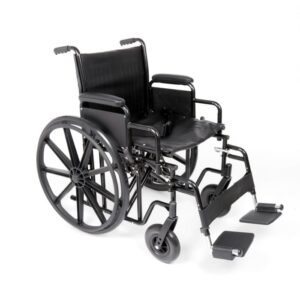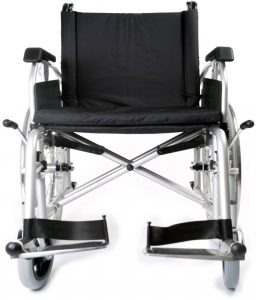Do you or a loved one require a bariatric wheelchair in order to increase mobility and reclaim your freedom? It can be challenging to find the perfect wheelchair that fits your specific needs. But don't worry—we've got you covered with our in-depth guide on selecting the ideal bariatric wheelchair.
This post will guide you through the key elements to take into account when choosing a bariatric wheelchair, including size, weight capacity, manoeuvrability, and comfort. We recognise that each person is unique, which is why it's critical to locate a wheelchair that meets your particular needs.
Because not all bariatric wheelchairs are identical, you can choose wisely when you know what to look for. Whether you require a wheelchair for short-term assistance or long-term recuperation, our guide will make sure you have all the knowledge you need to make an informed decision.

Choosing the ideal bariatric wheelchair can improve your independence and general quality of life in addition to your mobility. Now let's get started with our guidance and select the ideal wheelchair so you may fully enjoy life. Bariatric wheelchairs are made to fit those who need to be able to lift more weight than regular wheelchairs can. For people who are obese or have other mobility issues, these wheelchairs are designed with strengthened frames and broader seats to offer a safe and comfortable ride.
What to look for in a heavy duty wheelchair
In order to provide stability and avoid tipping, bariatric wheelchairs are designed to accommodate heavier weight limitations as well as distribute the weight evenly. They provide improved structural integrity, enabling people to move around with comfort and confidence. Using a purpose built bariatric wheelchair can significantly affect a person's mobility and general health. The following are the main advantages of choosing a bariatric wheelchair:
Greater Mobility: Bariatric wheelchairs give people who are obese or have restricted mobility the ability to move around on their own. These wheelchairs' robust design and greater weight capacity allow users to easily traverse various terrains and engage in daily activities.
Higher Comfort levels: Comfort is a key consideration in the design of bariatric wheelchairs. To offer ideal support and avoid discomfort or pressure sores during extended usage, they have broader seats, more padding, and adjustable parts.
Increased Independence: You may take back control of your everyday activities and lessen your dependency on others for mobility help by purchasing a bariatric wheelchair that meets your unique needs. Your general quality of life and mental health may benefit from your increased independence.
Customisable Options: A variety of customisable options are available for bariatric wheelchairs, enabling users to tailor their chairs to their own needs. These options, which range from varied seat sizes and backrest angles to adjustable armrests and leg rests, guarantee a customised fit for optimal comfort and functionality.
See our range of extra wide wheelchairs
Things to think about while purchasing a bariatric wheelchair
When choosing a bariatric wheelchair, a number of aspects need to be carefully considered. The following are some crucial factors to consider before making your decision:
Weight Capacity and Size: One of the most important things to take into account is the wheelchair's weight capacity. Selecting a wheelchair that can comfortably carry your weight is crucial. The weight capacities of bariatric wheelchairs typically range from 18 to 50 stones or more. It is important to take the wheelchair's size into account in addition to its weight capacity.

Make sure the seat depth and width fit your body type and leave enough room for comfortable sitting. For maximum support and to avoid discomfort, the right sizing is essential.
Seat Cushions: To offer support and avoid pressure sores, choose a wheelchair with sufficient seat cushioning. Seek for pillows with gel or high-density foam that evenly distributes weight.
Take a look at our range of heavy duty wheelchairs here
Armrests and footrests that are adjustable: Possessing armrests and footrests that are adjustable lets you arrange your arms and legs in the most comfortable way possible. For maximum comfort, look for wheelchairs that allow you to modify the width, height, and angle.
Reclining Backrest: A reclining backrest might offer more comfort and relief if you have to frequently change positions or spend a lot of time in your wheelchair. To select the wheelchair that best suits your needs, look for models that include several recline positions.
Wheelchairs with elevating leg rests are a good option if you have leg swelling or need to raise your legs for medical purposes. By raising your legs to a comfortable posture, these leg rests help to improve blood circulation and lessen discomfort.
Anti-Tippers: Look for bariatric wheelchairs that have anti-tip devices installed to protect you. In particular, these mechanisms keep the wheelchair stable and from toppling over when negotiating slopes or rough terrain. It is important to remember that wheelchair size might affect how manoeuvrable it is. Wheelchairs with greater bulk may be harder to manoeuvre through small openings or confined areas. To decide if a smaller or larger wheelchair would be more appropriate for your needs, think about how your home is laid out or the locations you usually visit.
We hope that you have found our guide useful If you have any specific questions that you want to ask before making a purchase then please give us a call on 0800 6335377.
